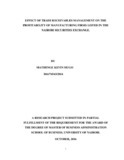| dc.contributor.author | Mugo, Kevin, M | |
| dc.date.accessioned | 2017-01-04T13:17:22Z | |
| dc.date.available | 2017-01-04T13:17:22Z | |
| dc.date.issued | 2016 | |
| dc.identifier.uri | http://hdl.handle.net/11295/98915 | |
| dc.description.abstract | Trade receivables arise in the day to day running of any firms. This is where firms sell goods to customers on credit with the premise that the customers will pay within an agreed period. This can lead to an increase in sales and also profits. However if the trade receivable is not collected within the agreed period it will lead to bad and overdue debt which will eventually result to reduction in profit.
This project investigated the relationship between trade receivables management and the profitability of the nine firms listed under the manufacturing and allied sector in the Nairobi Securities Exchange for the period 2011-2015. Profitability was measured using the Return on Assets. On the other hand accounts collection period, bad debt to receivables ratio and accounts receivables turnover were used to quantify the trade receivables management measures of the firms.
A descriptive research design was used in this study. The findings of the study were arrived at using the quantitative research method. The extent and nature of relationship between the various variables under study was identified using correlation and regression. Relationships among the dependent and independent variables and instances of multi-colinearity were evaluated using the Pearson correlation analysis. The study concluded that Accounts Collection period, bad debt to receivables ratio and accounts receivables turnover contribute to 24.7% of the overall profitability. The study concluded that the accounts collection period has a significant and negative effect on profitability while bad debt to receivables ratio had also a negative and but insignificant effect on profitability. However accounts receivables turnover had a positive but insignificant effect on profitability of manufacturing and allied firms listed in the NSE. The study recommended that a firm should structure its credit policy in such a way that it results to a reduction of its accounts collection period which has a significant effect on its overall profitability | en_US |
| dc.language.iso | en | en_US |
| dc.publisher | University of Nairobi | en_US |
| dc.rights | Attribution-NonCommercial-NoDerivs 3.0 United States | * |
| dc.rights.uri | http://creativecommons.org/licenses/by-nc-nd/3.0/us/ | * |
| dc.subject | Effect of Trade Receivables Management on the Profitability of Manufacturing Firms | en_US |
| dc.title | Effect of Trade Receivables Management on the Profitability of Manufacturing Firms Listed in the Nairobi Securities Exchange. | en_US |
| dc.type | Thesis | en_US |



